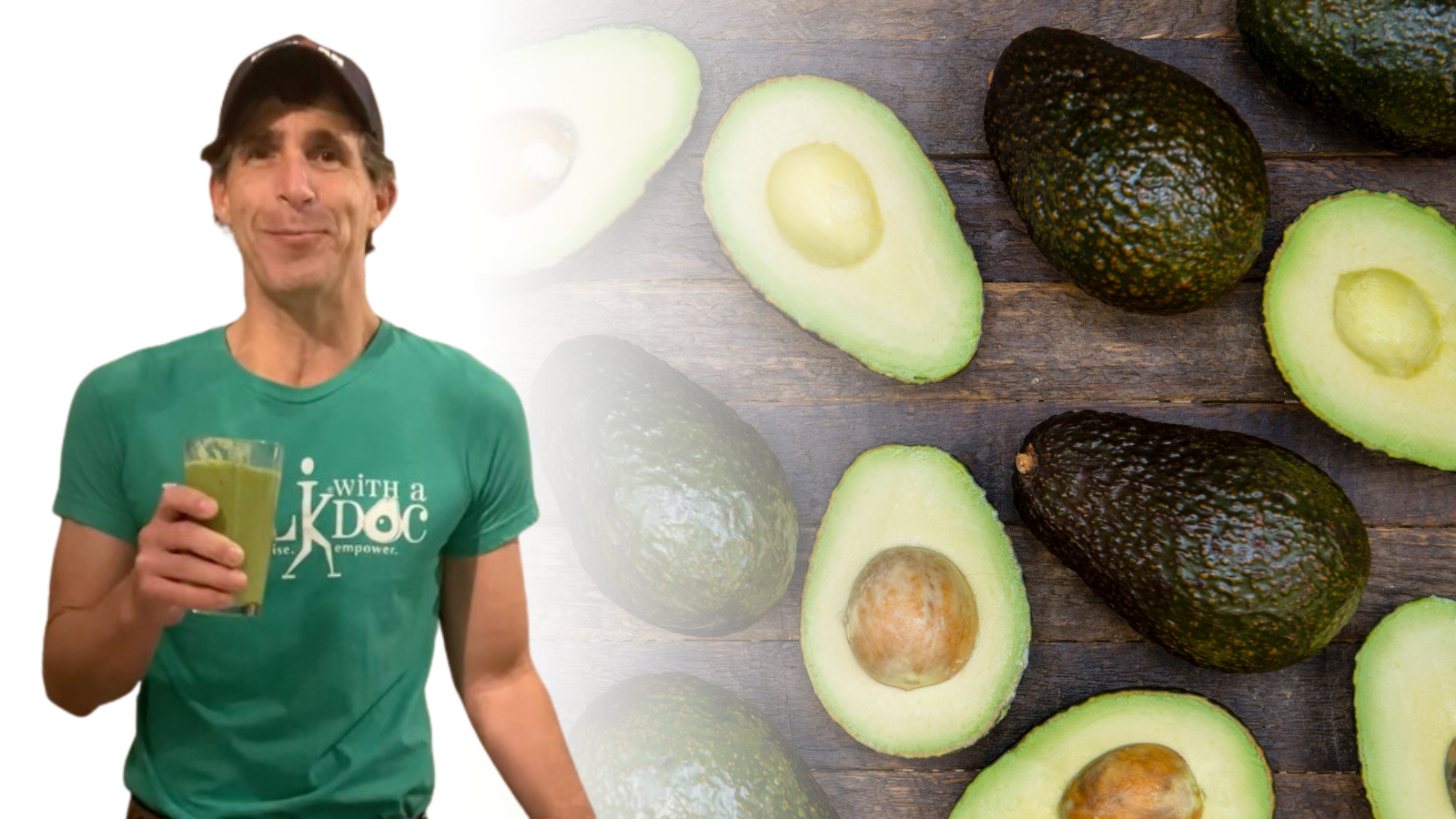Many of my new cardiology patients find themselves inspired by their newfound awareness that over 80% of heart disease is preventable, diet and movement being the crux of that message. A lot of them thought it was predetermined, but that is not really the case. I still love seeing that sparkle in their eye when they realize they are in control of their destiny. All the more so when they realize these lifestyle changes (more walking and more fruits and veggies) actually increase their quality of life, rather than being a burden.
I’m always eager to put on my sneaks for the 45-minute walk commute home. These walks always make me hungry and primed for my delicious post-workout snack, a delicious smoothie, which is my go-to to refuel after movement since adding ingredients like fresh avocado helps keep me satiated until dinner.
My wife, Krissy, is always there to support me, especially my healthiest habits. She’d gotten my ‘leaving’ text and was already taking out the avocado pits as I walked in from the garage.
She looks over her left shoulder across the kitchen island as both poodles jump up on me for the typical welcome home. “You know, it’s ironic, I was walking with Jodie this morning and she was asking me all sorts of questions about avocados. She knows you recommend them to your patients, and I had her text me her questions, so I’d remember to ask you. Do you mind? There are actually a few here”
“Fire away,” I say, as I stare at the fresh avocado. I’m hungrier than I thought. “Here, I’ll make our smoothie as you read.” I did not want to slow down this train.
“Okay. First, she asks ‘Do avocados have fat, sodium, or cholesterol?’”
Ahhh, Jodie’s getting right into it, huh? Actually, great questions.
They have no sodium or cholesterol, and they are low in saturated fat. We want unsaturated fats, and avocados contains 6 grams of unsaturated fat per serving (1/3 of a medium avocado). Just tell her avocados have the good fats, and if you really want to get fancy, you can tell her that if you replace the bad (saturated) fats with good (unsaturated) fats, like those in avocados, it can help reduce cholesterol levels in your blood which can lower your risk for heart disease and stroke. The American Heart Association and Dietary Guidelines for Americans say that.
“So that’s why you recommend them to your patients? Because of that stuff, right?”
“Yes, and some other reasons we may get to, depending on how good Jodie’s questions are.”
“Oh, oh! Tell her about MUFA!”
“MUFA?”
“Yeah, I just love saying that word.”
“It’s not a word,” Krissy says.
“Yep, I love that acronym. It stands for monounsaturated fatty acid. MUFA is important because it’s a good fat. Avocados are essentially the only fruit with good fats, specifically MUFAs though they also contain polyunsaturated fats (PUFAs). As I was kind of saying before, the Dietary Guidelines for Americans recommends replacing bad fats with good fats, like MUFAs, as these good fats give our body benefits without raising LDL (bad) cholesterol levels.”
Krissy does not yet look convinced. “Can ‘fat’ ever really be good?” she asks.
“That’s a fair question. The naturally good fats in avocados are important because our body needs some fat to help us absorb nutrients.”
Her thumbs are moving a million miles a minute getting this stuff back to Jodie.
“Ok, got it.” She looks up from her phone, “Jodie loves her doctor, and he told her she needed to get more fiber in her diet. She wants to know if avocados have fiber?”
“Yep, her doc’s right. Fiber can help in reducing heart disease, obesity, and type 2 diabetes. And fortunately for us (I point at the whirring blender), this stuff does have fiber and 35% of the avocado’s fiber is soluble. Soluble fiber is important because it prevents our gut from absorbing cholesterol and reduces our risk of heart disease. See, all this helpful information. Aren’t you glad you married a cardiologist?”
No response.
“She’s right to be on to fiber because 90% of women and 97% of guys don’t get enough to meet our daily requirements.”
“97?!” Krissy asks.
“Crazy, right?”
“Ummm, she also asked whether or not avocados have potassium?”
“Yes, a serving has 6% of our daily potassium and a potassium rich diet may offset some of sodium’s effects on blood pressure.”
“Then she says, ‘any other questions I should ask?’”
“If you want to impress her, tell her avocados are the richest known fruit source of phytosterols. Phytosterols can be important cholesterol-lowering compounds when you eat them twice a day with a low saturated fat and cholesterol diet.”
Krissy can type so fast. She sends that off and within a minute there are three dots. Jodie eats this stuff up and is a very fast reader.
Krissy smiles and looks up, laughing for a second. Jodie says, “Okay, thank you. I really trust Dave, but does he have studies to back this up or is this because he owns an avocado costume (it has a supercool removable brown pillow ‘pit’)?”
“You can take Jodie out of the lab, but you can’t take the science out of Jodie. There are studies.” I’ve poured our two glasses of smoothie and I’m literally salivating as I hand Krissy hers. I wash my hands and get my phone. “I’ll forward some. This one was a randomized, controlled trial looking at cardiac markers in people who had just eaten a low-fat, higher-carbohydrate breakfast vs a breakfast with similar calories but with avocado.”
I keep scrolling.
“Oh, here’s another good one. This is a 30-year study looking at avocado consumption as it relates to the risk of cardiovascular disease in US adults.”
“Oh, oh – the last one I promise. This one looks at the impact of foods, including avocados, on LDL, that bad cholesterol we were talking about earlier.”
Then all of a sudden there is a pause, a quiet moment when everything in the room goes still. The kids are gone, and Krissy and I look into each other’s eyes, put down our phones…and pick up these DELICIOUS SMOOTHIES (recipe below)!
Bottoms up, my friends.
David
Dr. Sabgir’s Smoothie Recipe, serves 1
Add the following to a blender, blend, and enjoy!
- ½ medium ripe avocado
- 1 cup frozen pineapple chunks
- ½ cup frozen mango chunks
- 1 inch knob of ginger, peeled
- 2 cups organic spinach
- 1 cup unsweetened almond milk (adjust as needed)
- 1 banana
- Juice from 1 lime
- Optional: 1 tbsp hemp seeds or flaxseed meal
Check out some other delicious smoothie recipes or if you’re looking for alternative snacks to fuel up after a workout here are some other great options featuring fresh avocado.


